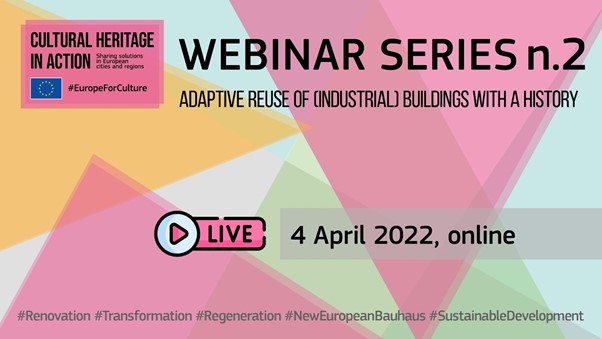
Adaptive reuse of (industrial) buildings with a history
The Cultural Heritage in Action peer-learning programme has launched a "Sharing stories" webinar series to showcase leading cultural heritage initiatives driving sustainable urban and regional development in European cities and regions.
The second webinar in the series will focus on “Adaptive reuse of (industrial) buildings with a history” and take place on Monday 4 April 2022 at 14:00-15:30 CEST. It will give the opportunity to explore, through concrete examples, the benefits of re-using heritage sites, the challenges inherent to adaptive re-use projects as well as the drivers of quality interventions on cultural heritage. Speakers from Ljubljana, Brno and Valladolid will participate in the event.
Some of the questions that will be explored during the webinar are: How to preserve cultural, historic, spatial and economic values of underused heritage buildings while at the same time adapting them for new, contemporary uses? What are the benefits of re-using heritage places? What are the challenges inherent to adaptive re-use projects? What are the drivers for quality interventions on cultural heritage – bringing economic and social values to local communities?
Find more details and register here.
Background
Europe has a rich and multi-faceted built environment, incorporating strong spiritual, cultural, social and economic values. Due to evolutions in our economies and societies, many heritage sites, whether listed or not, are nowadays disused or have lost the functions for which they were originally built – notably industrial sites.
However, heritage buildings that have lost their original function still embody their multiple values. Adaptive re-use offers itself as a strategy aimed at preserving the elements that contain these values, while at the same time adapting the place for new uses and meeting the needs of our time. Through smart renovation and transformation, heritage sites can find new, mixed or extended uses. As a result, their social, environmental and economic value is increased, while their cultural significance is enhanced.
Sensitive adaptive re-use of existing and historic buildings can also play a key role in Europe’s green transformation, avoiding energy-intensive new construction and land use, promoting waste avoidance and preserving embodied energy while generating additional positive economic, environmental, social and cultural co-benefits. For this reason, the re-use of (industrial) heritage buildings offers many opportunities for advancing the goals of the New European Bauhaus initiative launched by the European Commission in 2020.
- 04/04/2022 - 14:00 - 04/04/2022 - 15:30
- This meeting will take place online
- Ewa Chomicz
-
Working Group